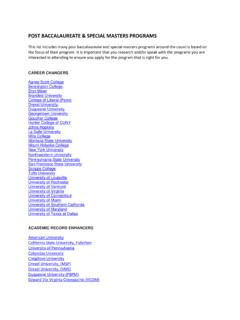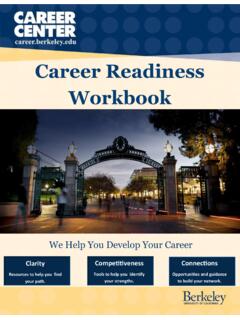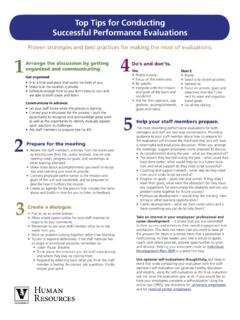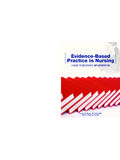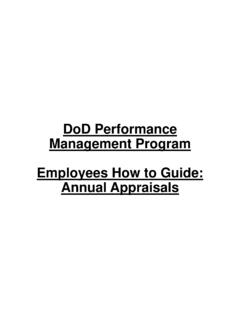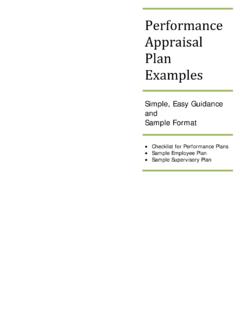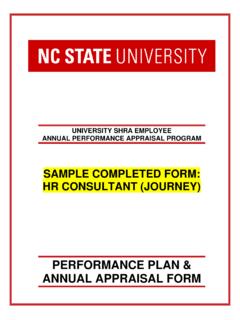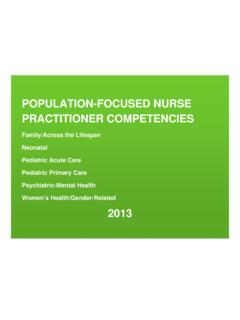Transcription of Interviewing - University of California, Berkeley
1 The Career Center is committed to help all students achieve:CAREER CLARITY | CAREER COMPETITIVENESS | CAREER CONNECTIONSFind the comprehensive Job & Internship Guide on nce you get to the interview stage of the application process, you have succeeded in convincing an employer to invest time in meeting you. When you developed your resume and cover letter, you already: analyzed the job description; identified and conveyed your skills and accomplishments most relevant to the position; researched the employer; and explained what attracted you to the there is more to do before the interview so you are prepared to answer questions on the spot and articulate what makes you a truly compelling candidate.
2 Preparing for an InterviewDon t let your first interview be your first time actually answering interview questions! Consider the following strategies when preparing: Write out answers to questions you think the employer will ask. See samples in this chapter. Practice saying your responses out loud. Answering potential questions in front of a mirror can make you more aware of your facial expressions and gestures. Practice with friends or family, or schedule an appointment with a Career Counselor at the Career Center.
3 Ask for feedback on the content and organization of your answers (completeness, level of detail, how easy to follow) and your presentation style (pace, voice quality/tone, energy, posture, eye contact, hand gestures). Film or record your responses and review your performance . Ask yourself, Did I look/sound confident, relaxed, and enthusiastic? What does my body language say? How were my pace and volume? OFind out what type of interview you will have. Types of interviews include: One-on-one: Just you and one interviewer, the most common type of interview Panel: You are interviewed by more than one person at the same time Group: A group of candidates is interviewed by a panel or one interviewer Meal: You are interviewed while eating, usually over lunch Working: You are put to work and observed Phone or Video: Often used as a screening tool before inviting you to an on-site interview On-Site or Second Round.
4 After you have made it through a screening interview, this is a more extended interview at the employer site that may include a series of different types of interviews, a site tour, and a & Internship Guide Feeling Nervous?It is normal to feel nervous about interviews. In fact, being a little nervous can motivate you to prepare and do your best. But worrying about being nervous usually just makes you more nervous! Try focusing instead on being self-confident. To harness your nervous energy, think about five things (qualities, skills or experiences) you would like the employer to know about you and practice presenting these a second round interview means you are being considered seriously for a position.
5 The employer will have a chance to gain a more complete picture of what you offer. They will also see how well you fit in with the company culture and with other team members. Begin preparing by reviewing how you did in your first interview. Which aspects did you handle well, and which did you struggle with? Use this information to plan what you will continue to do and what you will try to improve in the second , gather new information you can bring into the second interview by continuing to research the company and industry.
6 If you haven t done so yet, consider setting up informational interviews (see p. 2) with staff members who aren t on the hiring committee. You may have the best luck if you can find alumni working at the the Interview: Confirm the date, time, location, and name of the person you should ask for when you arrive. Allow plenty of time to get to the interview site and arrive at least 10 minutes early. Make any necessary travel arrangements. If traveling out of the area, ask whether the company will make reservations for you.
7 Keep any receipts. Some medium and large sized companies may help with expenses. Try to find out in advance what the agenda will be and with whom you will be Interviewing . Have ready extra copies of your resume, transcripts, references, and all employer forms that you have been asked to complete. Come up with at least five questions to ask the employer; see p. 36 for sample questions. Alert references that they may be contacted. Preparing for a Phone or Video InterviewIn a screening interview, an employer is generally looking for clear interest, a positive attitude, solid communication skills, and evidence that your qualifications and experience make you a good fit for the Tips: Schedule the interview for when you can give 100 percent of your attention and take the call in a quiet place with good reception/wifi.
8 Be prepared with lists of points you want to make, your skills and accomplishments with specific examples, and questions to ask. Keep a copy of your resume and the position description nearby. Have your calendar available in case you need to set up another interview. Listen actively and avoid interrupting the interviewer; ask for clarification if you need it, and think out your responses before answering. Speak clearly and slowly enough so that the interviewer can understand you without difficulty. Project enthusiasm in your voice to show you are excited about the possibility of getting the position and appreciate being Tips: Stand up during your phone interview; this will help with your energy.
9 Show enthusiasm for the position be sure to smile it will come through in your voice. Avoid saying uh, um, er, or you know. These fillers are more noticeable on the phone. Dress in business casual attire to help put you in an interview mindset. Have the company website open on your computer to Tips: Look directly at the camera, not the screen, to maintain eye contact with the interviewer. Dress from head to toe as though you were having an in-person interview. Pick a place with a neutral, uncluttered background.
10 Run through a practice video interview with a friend to get used to the technology. Pay attention to your body language maintain good posture and relax your for a Second Round Interview At the Interview: Turn off your cell phone, and do not chew gum. Be respectful to everyone. Job offers have been denied based on how applicants have treated administrative staff. Build rapport in the first 5 seconds. When your interviewer comes into the waiting room and calls your name, walk toward that person with confidence, make eye contact, extend your hand for a handshake, and say, Hello, I m (insert your name here).
